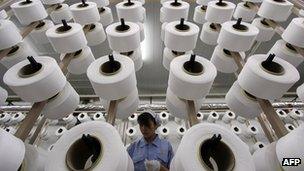China export and import growth slows sharply in July
- Published

Demand for Chinese products has been falling in some of its biggest markets
China's export and import growth slowed for the second straight month in July, raising fears about the strength of the world's second-largest economy.
Exports rose by 1% from a year earlier, down from 11.3% growth in June, amid slowing demand from key markets.
Meanwhile, imports rose by 4.7% compared with 6.3% in June, indicating that domestic demand was also slowing.
Analysts said the data was weaker-than-expected and may see Beijing introduce stimulus measures to spur growth.
"Trade data has come in dramatically below expectations - the worst export growth number (excluding Chinese New Year) since November 2009 - highlighting the risk that the external environment poses to an economy in the midst of a rapid internal slowdown," said Alistair Thornton of IHS Global Insight in Beijing.
"The government is likely to respond by ramping-up its stimulus efforts, with both monetary and fiscal guns firing."
'Distraught'
The data comes just a day after China reported that growth in industrial output fell to a three-year low in July.
Industrial production rose by 9.2% during the month, from a year earlier, down from 9.5% increase in June.
At the same time, growth in retail sales during the month also fell short of forecasts.
Analysts said that the weak data had raised concerns that the economy may be slowing faster than previously thought.
"Things really aren't going China's way," said IHS Global Insight's Mr Thornton.
"Those looking for signs of resilience in China's economic data were merely disappointed yesterday, but they are going to be distraught today."
Further easing?
China's economics growth has slowed in recent months. Its economy expanded at an annual rate of 7.6% in the April to June period, the slowest pace of growth in three years.
And there are fears that growth may slow further in the near term.
As a result, Beijing has taken various measures to spur activity.
China's central bank has cut its key interest rates twice since the start of June and reduced the amount of money the country's banks must keep in reserve, in a bid to boost lending.
However, analysts said that policymakers needed to do more to trigger growth.
"With the export sector losing speed faster than expected, the government's current investment stimulus plan looks woefully inadequate," Mr Thornton said.
He added that the government may cut borrowing costs again in the coming months and also increase its investment programmes to help achieve a higher rate of growth.